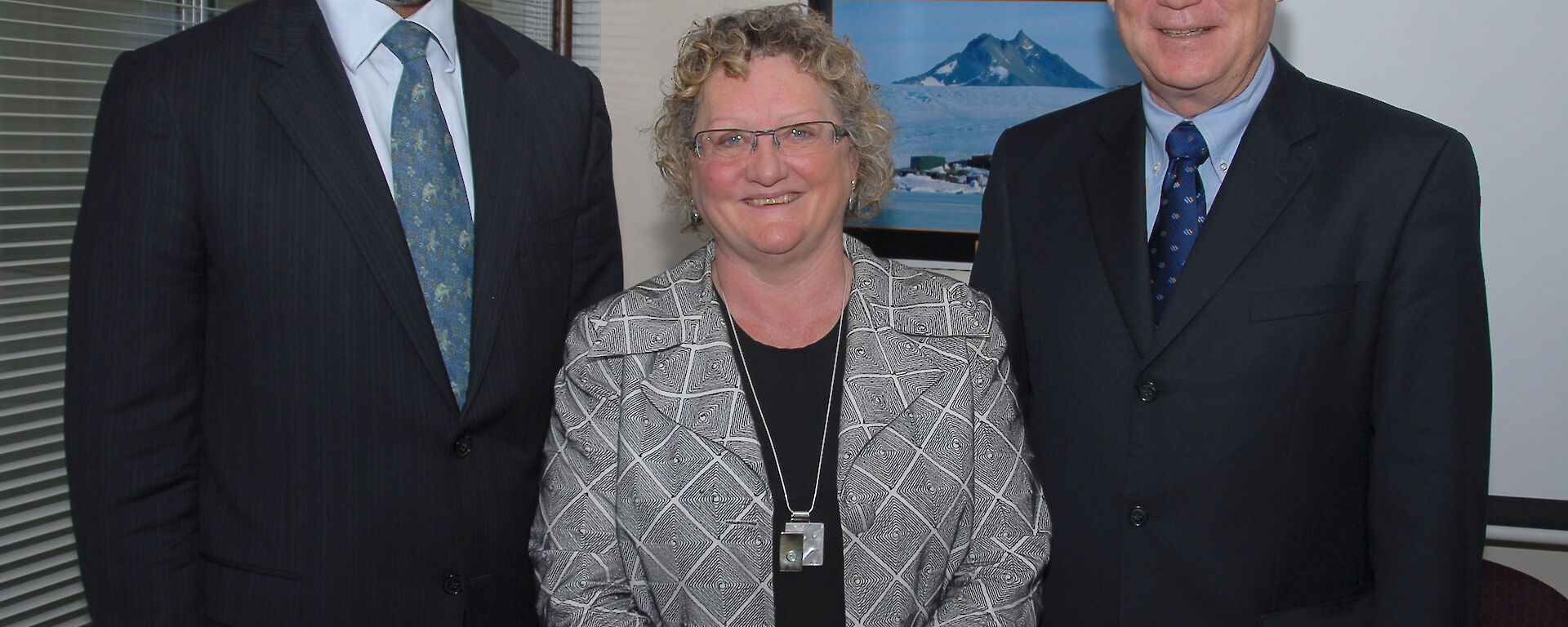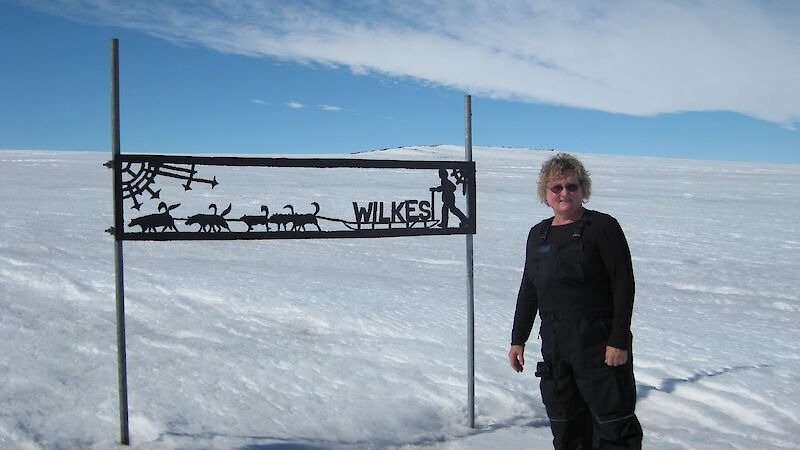Throughout her varied career Lyn Maddock has acquired skills and knowledge that, when viewed collectively, cut a logical path to the Director’s seat at the Australian Antarctic Division.
After completing an economics degree at the University of Queensland, Lyn began her public sector career in the Australian Bureau of Statistics, and as a research economist at the Bureau of Roads. She then moved into a long career as a policy economist in the Prime Minister’s Department, where she worked on microeconomic issues relating to transport, health and trade policy. She stepped into the private sector briefly, with a stint in government relations at Westpac, before moving back to the public sector in the Productivity Commission’s new Melbourne office. Here she conducted research into restrictive practices in the labour market, competitive tendering by the public sector, the Australian gas market, and developing and reporting on comparative performance indicators for states in areas such as courts, prisons, child protection, education and health.
'My work at the Productivity Commission drove home the importance of ensuring that operating practices are sufficiently documented,' Lyn says.
'The new Melbourne office was expected to run in the same way as the Canberra office, but most of the organisation’s policies and procedures were embedded in peoples’ experience and passed down informally, so we often found ourselves reinventing practices we didn’t need to.
'If you've got a high turnover of people, as the Antarctic Division has each summer with new expeditioners, it’s important that processes and the things that drive an organisation’s culture — which are often not written down — are managed or documented appropriately.'
In 1997 Lyn took a job as Deputy CEO of the National Occupational Health and Safety Commission, with responsibility for managing research, the occupational health and safety dataset, and the organisation's strategic and business planning.In 2000 she was engaged as Deputy Chair of the Australian Broadcasting Authority (ABA), which led to her managing the ABA merger with the Australian Communications Authority and leading the new body, the Australian Communications and Media Authority.
'This was a fascinating and challenging experience which taught me a lot about managing difficult situations,' she says.
Lyn spent nine months in 2008 establishing Screen Australia, which included rethinking policies for film funding.
'All these skills — policy and research in the Prime Minister’s Department, public relations from Westpac, policy and procedure implementation from the Productivity Commission, management and business planning from the safety commission, ambiguity and change management from the communications and broadcasting authorities, and the experience of working within and outside government — will be important in my role at the Antarctic Division,' Lyn says.
Lyn also brings experience as a player and coach of state level hockey, which she says taught her about management and delegation. And she has a (recently expired) pilot’s license.
'Flying is one of the few things in life where you're on your own and you have to make a decision. It gave me confidence in my judgement.'
Since she took up the directorship of the Division in February, Lyn has put her considerable energy and experience into obtaining the knowledge, advice and networks needed to address the challenges ahead for both the organisation and government.
'I've come to the Antarctic Division at a time when the skills I have to offer will be most useful,' she says.
'The Division has entered a period of significant change that includes the effect of the new airlink, the need to rethink our shipping needs, an increased focus on national security, an increase in the number of nations active in Antarctica, the importance of climate change research, executive staffing changes and budget pressures. These have all occurred at once and I hope to be able to help the organisation find its path through and beyond these issues.'
In an organisation with multiple objectives — including science, policy and sovereignty — tradeoffs and tensions between these objectives are inevitable. Lyn is keen to ensure the organisation fully understands the implications and costs of decisions and consequent tradeoffs and can communicate this to government and others.
'My priority in the first six months is to make sure we've got all the management information we need to make sophisticated judgements and to make sure we're telling a sophisticated message to our audiences. To do this we need a clear understanding of what is core business and what isn’t,' she says.
'We've got to understand the fundamentals of each of our objectives so we're not trading off essential business for non-essentials. And we need to know the full costs — financial and otherwise — so that we can understand the implications of the tradeoffs.'
Lyn and her executive team are developing policy advice on the critical issues for the Division — shipping, air support, endorsement of a new science strategy, and the organisation’s budget — and decision options.
'I want to receive whole of government authority to proceed with these options according to an agreed timetable,' she says.
Lyn has also managed to fit in a trip to Antarctica on the airlink, where she experienced a night out in the field, kitchen duties at Casey station, and the difficulties of conducting science and logistical activities in the cold. She recently attended the 32nd Antarctic Treaty Consultative Meeting in the US to mark the 50th anniversary of the Treaty; and hosted the US Embassy Chargé d'Affaires, Dan Clune, and US Consulate General Principal Officer, Michael Thurston, during a tour of the Antarctic Division. Her infectious enthusiasm for her new role has also been captured on local television and demonstrated through her engagement with staff.'This is a wonderful opportunity for me to be part of an organisation that is highly regarded for its operational and scientific prowess, that has a complex set of objectives to fulfil, and to be with people who have a passion for their work and for Antarctica,' she says.
'I look forward to building on the good work the Antarctic Division is already engaged in, to further develop an organisation that is open, confident, curious, rigorous, passionate and outcomes focussed.'
Wendy Pyper
Corporate Communications, AAD



